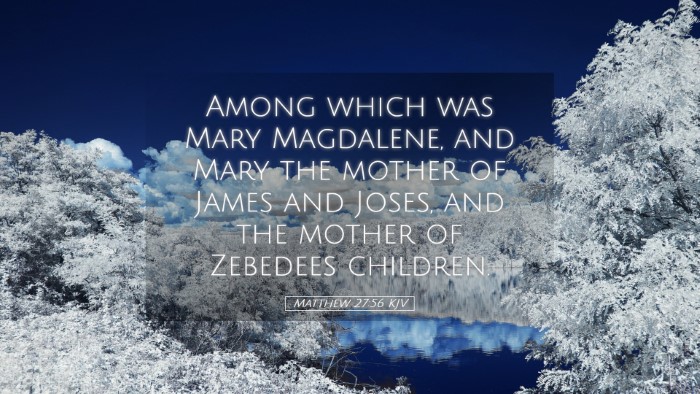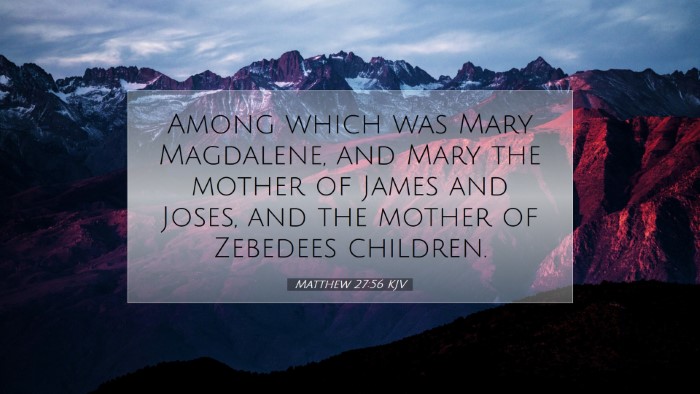Commentary on Matthew 27:56
Matthew 27:56 states: "Among which was Mary Magdalene, and Mary the mother of James and Joses, and the mother of Zebedee's children." This verse occurs in a poignant moment of the Passion narrative, highlighting the presence of women at the crucifixion of Christ. This commentary draws on the insights provided by Matthew Henry, Albert Barnes, and Adam Clarke, offering a cohesive understanding of this significant verse.
Contextual Background
During the crucifixion of Jesus, many followers witnessed the events unfold from a distance. This verse lists the women present, emphasizing their devotion amidst the surrounding turmoil. The mention of these individuals provides a lens through which we can appreciate the gravity of the moment, as well as the roles that women played in Jesus' ministry.
Insights from Commentators
Matthew Henry's Perspective
Matthew Henry points out that the presence of these women signifies their unwavering commitment to Christ, even in His darkest hour. He emphasizes the contrast between the male disciples, who fled in fear, and the women who remained steadfastly at the foot of the cross. Henry notes:
- Devotion: The women displayed remarkable courage, showing that true discipleship often comes with a cost. Their willingness to stay near Jesus in His suffering illustrates profound loyalty.
- Witness to the Crucifixion: Their presence is significant as they were among the few who witnessed the crucifixion and were later the first to proclaim the Resurrection, underscoring the pivotal role women played in the early church.
Albert Barnes' Commentary
Albert Barnes focuses on the identities of the women mentioned in this passage, providing insights into their backgrounds:
- Mary Magdalene: Barnes notes that Mary Magdalene had a profound transformation after encountering Jesus, having been delivered from seven demons. Her presence at the crucifixion signifies her deep gratitude and loyalty to Christ.
- Mary the mother of James and Joses: This Mary is often considered to be the sister of Jesus' mother, highlighting the familial connections that further deepen the emotional weight of the scene.
- The mother of Zebedee's children: Also known as Salome, her presence demonstrates the longstanding support of Jesus by His followers, including family members.
Adam Clarke's Observation
Adam Clarke provides a theological perspective on the impact of these women's faith:
- Faithfulness in Suffering: Clarke emphasizes that the women's steadfastness illustrates a crucial aspect of faith—the ability to endure hardship and witness suffering. Their presence during Christ’s crucifixion is a testament to true discipleship that does not waver in the face of adversity.
- Role in Resurrection Narrative: Clarke discusses how these women would later be instrumental in sharing the news of Christ's resurrection, thus solidifying their importance in the early Christian community and missionary work.
Theological Implications
This verse invites reflection on several important theological themes:
- Discipleship: The contrast between the disciples' apprehension and the women's faithfulness serves as a profound reflection on the nature of true discipleship. It challenges believers today to contemplate their commitment to Christ, particularly in times of trial.
- Gender Roles in Ministry: The involvement of these women in the crucifixion accounts and the resurrection narrative emphasizes the critical role that women have played in the history of the Church, challenging contemporary attitudes towards gender roles in ministry.
- Witness of Faith: The testimony of these women provides a model for modern believers regarding the importance of witnessing to one's faith, even in the midst of suffering and hardship.
Conclusion
Matthew 27:56 poignantly portrays the steadfastness of women disciples during the crucifixion, highlighting their integral role in the narrative of Jesus' death and resurrection. The insights of Matthew Henry, Albert Barnes, and Adam Clarke remind pastors, students, theologians, and Bible scholars of the profound implications of this verse, as it informs our understanding of discipleship, the significance of marginalized voices in ministry, and the unwavering witness of faith in the face of suffering.


